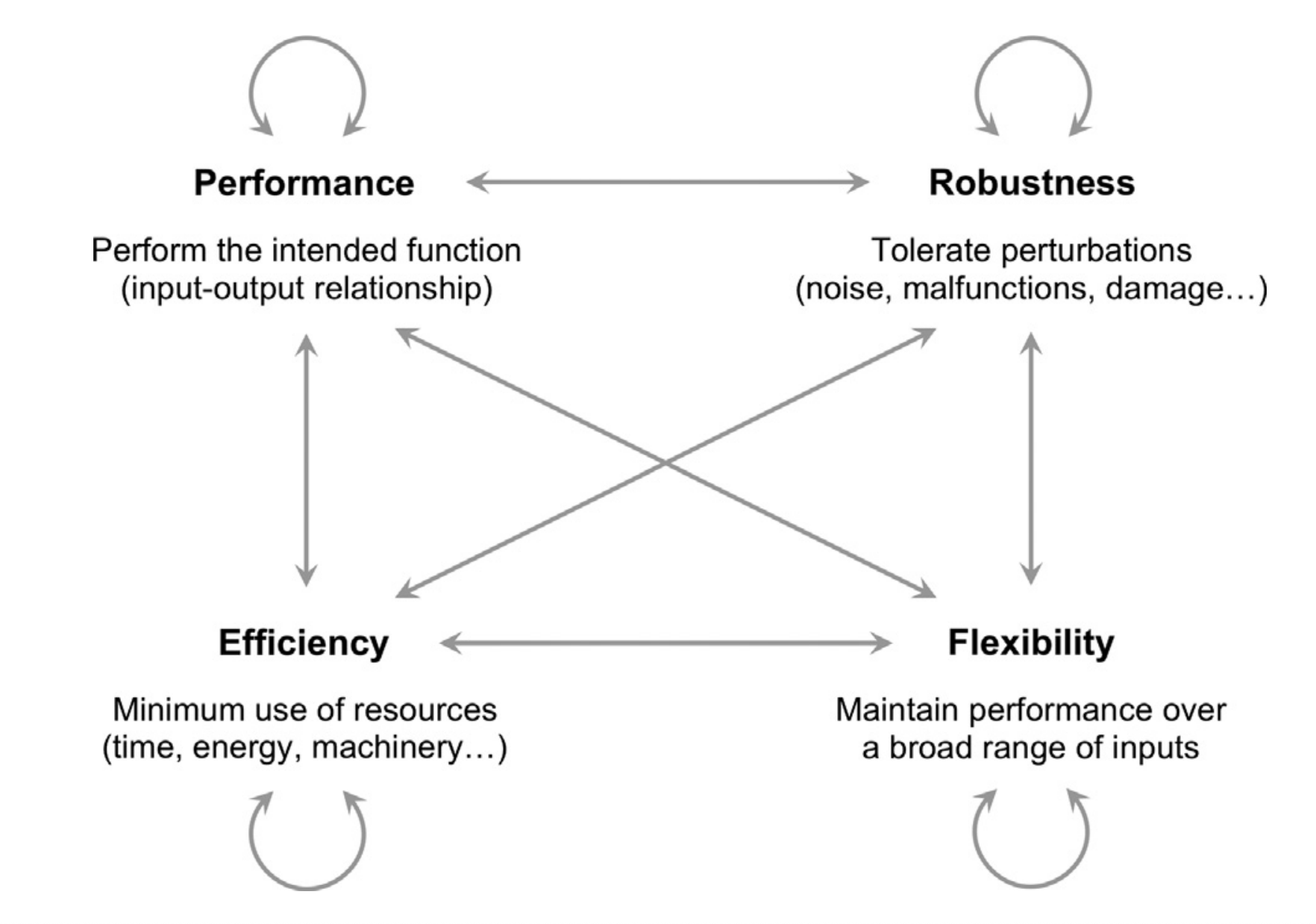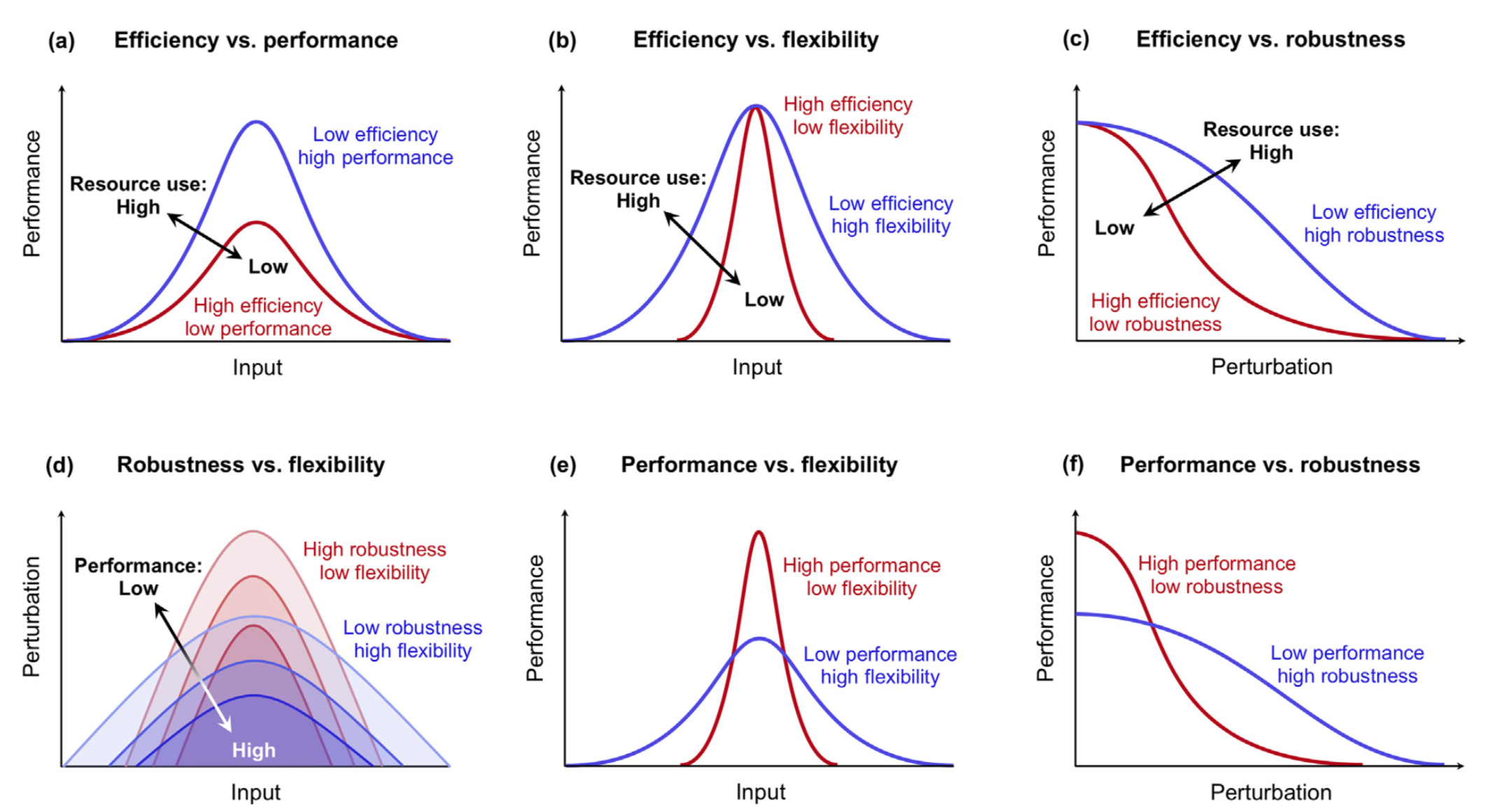Functional Trade-offs
post by weathersystems · 2021-05-19T01:06:08.518Z · LW · GW · 0 commentsContents
Definitions Trade-offs Performance vs Efficiency Performanc vs Robustness Efficiency vs Robustness Performance vs Flexibility Efficiency vs Flexibility Robustness vs Flexibility None No comments
I found this super cool paper from Marco Del Giudice and Bernard J. Crespi called Basic functional trade-offs in cognition: An integrative framework that I thought y'all would like. What follows is largely just a condensed version of their paper where I take the most relevant quotes and paste them here, but I highly recommend reading the full paper.
This paper takes an initial step toward a general theory of cognitive trade-offs by examining four key properties of goal-directed systems: performance, efficiency, robustness, and flexibility. These properties define a number of basic functional trade-offs that can be used to map the abstract “design space” of natural and artificial cognitive systems. Basic functional trade-offs provide a shared vocabulary to describe a variety of specific trade-offs including speed vs. accuracy, generalist vs. specialist, exploration vs. exploitation, and many others.
We could not find other examples of properties that were both universal (i.e., would apply to all functional systems) and similarly general (i.e., were not already en- compassed by the basic ones). This assertion does not mean that the classification we propose is fully exhaustive or that it cannot be extended in principle, and we encourage its growth and elaboration.

Definitions
Performance: "The performance of a system is usually defined as its ability to produce an intended result (or some other roughly equivalent formulation)."
Efficiency: "The efficiency of a system is its ability to perform its function with minimal use of resources."
Robustness: "Robustness is the ability of a system to maintain performance in the face of perturbations. There are many possible kinds of perturbations, both external (e.g., physical damage, extreme events that exceed the system’s operating range) and internal (e.g., component failures, conflicts between subsystems). Cognitive systems are particularly exposed to perturbations caused by information corruption or noise."
Flexibility: "For cognitive systems, we suggest that flexibility can be recast as the ability to maintain performance (i.e., produce the intended input-output relationship) over a broad range of inputs, potentially including novel or unanticipated ones. We construe inputs broadly to include variation in operating conditions, domains of application, task demands, and so on [...] Note that this working definition of flexibility focuses on the “signal” component of inputs, in contrast with robustness which is defined in relation to noise and perturbations. The definition highlights the main challenge faced by flexible systems—that is, distinguishing between novel/unusual but acceptable inputs (to which the system should adjust) and noise or other perturbations (that should be rejected or eliminated)."
Trade-offs

Performance vs Efficiency
The idea that reducing resource use may limit performance is an intuitive one, and there is a rich literature on trade-offs between efficiency and cognitive performance (Fig. 2a). The best-known case is arguably that of speed-accuracy trade-offs, a broad class of phenomena in which faster performance on a task (i.e., more efficient use of time) leads to less accurate responding (Garrett, 1922; Heitz, 2014).
...
In many contemporary cognitive models of decision-making (e.g., drift-diffusion models), the trade-off arises from the sequential sampling of information. By the logic of these models, more time spent sampling a noisy input translates into a better estimate of the actual state of the world, which in turn permits more accurate decisions (see Heitz, 2014). A similar trade-off applies to inference algorithms that progressively refine their estimates through multiple iterations (e.g., Bayesian sampling)...
Another class of pervasive trade-offs involving time efficiency is that of exploration-exploitation trade-offs (Hills, 2015; Mehlhorn et al., 2015). In many types of cognitive tasks, it is possible to increase performance by sampling the environment for information and looking for additional options (exploration) instead of simply choosing the best option among those already known (exploitation).
...
Classic examples of this trade-off have been described in foraging (exploiting a known patch of food vs. searching for more abundant patches; Charnov, 1976) and mate choice (mating with a current attractive partner vs. waiting for better opportunities; Todd & Miller, 1999)
Performanc vs Robustness
It is a common observation in systems biology and engineering that systems optimized for high performance on a certain task usually exhibit fragilities to perturbations, giving rise to performance-robustness trade-offs (Kitano, 2007, 2010; see Fig. 2f). The evolution of modularity is a case in point. Individual modules become highly specialized for specific tasks or functions, so that performance increases (as well as efficiency); however, if a module is damaged the larger system may completely lose the ability to perform the corresponding task, with potentially dramatic consequences. Thus, selection for robustness may often work against the modularization of tasks, whereas selection for performance and efficiency tends to promote it (Rueffler et al., 2012; see also Clune et al., 2013).
Efficiency vs Robustness
Most robustness strategies based on multiplicity require additional and potentially costly machinery—backup components, redundant subsystems, distributed units—as well as the energy to build, operate, and maintain it (Frank, 2008; Gluck et al., 2012).
...
Improving component quality, purging the system of defective units, and adding specialized mechanisms such as sensors and feedback control loops can be similarly demanding in terms of resources. These pervasive trade-offs with efficiency have been labeled robustness-resource trade-offs (Kitano, 2007; see Fig. 2c)
Performance vs Flexibility
The tension between performance and flexibility is captured by the adage “Jack of all trades, master of none” (Fig. 2e). In behavioral ecology, this concept has been explored in the study of generalist-specialist trade-offs. Generalists are species or individuals who occupy a broad range of ecological niches (e.g., multiple food sources and foraging strategies), whereas specialists are restricted to a particular niche. A generalist lifestyle requires higher neural flexibility, including the ability to process different types of cues and keep track of more information about the environment. Because neural and cognitive resources (e.g., attention, memory) are inherently limited, specialists are expected to perform better than generalists when they operate in their particular niche—for example by making fewer errors and more accurate decisions during foraging (Bernays & Wcislo, 1994; Dall & Cuthill, 1997; Tosh, Krause, & Ruxton, 2009).
Efficiency vs Flexibility
In addition to performing better than their more flexible counterparts, specialized cognitive systems that process a narrow range of inputs often show improved efficiency (Fig. 2b). In ecology, there is evidence that specialists make faster decisions than generalists when faced with the same tasks (e.g., Bernays & Funk, 1999), and some theories of specialist advantages in cognition emphasize speed as well as accuracy (Bernays & Wcislo, 1994; Dall & Cuthill, 1997). To the extent that flexible cognition requires more intensive processing and a more spacious memory, one can also predict that—all else being equal—ecological specialists should have larger, more complex, and/or more energetically expensive brains than generalists. While the comparative study of brain structure is fraught with methodological difficulties (see Healy & Rowe, 2007), there is initial evidence that species that inhabit broader ecological niches tend to have larger and more complex brains, all else being equal (Lefebvre & Sol, 2008).
Robustness vs Flexibility
[A] common strategy to increase a system’s resistance to noise and perturbations is to make it less sensitive to fluctuations in the input, which are rejected or eliminated. Since reducing noise effectively narrows the range of acceptable inputs, it is often the case that enhancing a system’s robustness simultaneously reduces its flexibility to some extent (Fig. 2d). In psychology and neuroscience, this is often referred to as the stability-flexibility dilemma, with “stability” used as synonym for robustness as defined here (Goschke, 2000; Liljenström, 2003). Computational models of neural networks show that introducing a certain amount of spontaneously generated noise (e.g., through chaotic oscillatory dynamics) increases the net- work’s responsivity to new inputs and prevents the system from getting stuck in non-optimal states—all while reducing its stability (Liljenström, 2003).
...
Proactive control is more robust against perturbations and interference, but also less flexible; its anticipatory, feedforward nature makes it hard to adjust behavior if environmental conditions change unexpectedly. Reactive mechanisms can easily respond to change, but are also more vulnerable to the effects of environmental noise (Braver, 2012; see also Tops, Boksem, Luu, & Tucker, 2010). The balance between proactive control (robust but inflexible) and reactive control (flexible but fragile) may contribute to broader individual differences in behavior, which in the animal literature are captured by the distinction between proactive and reactive coping styles (defined as stable patterns of behavioral and physiological responses to challenges; see Coppens et al., 2010; Del Giudice, 2015)
In the interest of brevity I've left out a bunch of stuff. There are many more examples of each category of tradeoffs in the paper. And they do a good job at highlighting possible exceptions to the trade-offs (that is, places where the two factors under very specific circumstances may reinforce each-other). They also explain how each factor (eg efficiency) can conflict with itself (eg time efficiency often conflicts with space efficiency in computer science).
0 comments
Comments sorted by top scores.